'Pan's Labyrinth' - Film comments and picspam
Saturday night I went to see Pan's Labyrinth with friends. While all of us had wanted to see it, I think the other couple were extremely shell-shocked by it when we came out, so it wasn't until the car ride home with icajoleu that we were able to really talk about the movie.
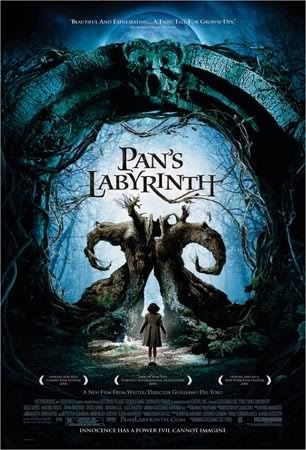
It is a gorgeous film. Directed by Mexican director Guillermo del Toro, El Laberinto del Fauno (it's Spanish title) is visually spectacular and so imaginative throughout its fantasy sequences, but it is also one of the most visceral and terrible (please note that I use "terrible" NOT in the sense of "bad" but rather in the sense of extreme/intense/severe) films I've ever seen. I rarely have to cover my eyes or look away, and I did in this film.
When the film let out, icajoleu asked me and N if we liked the film. I said: "I don't think "like" is the word I can use. It's not a question of like. It was incredible and beautiful and terrible all at the same time." Which means that it's very hard for me to recommend this film - if you can take it, and are willing to sit through one of the darkest films you may ever see, then please, by all means, knock yourself out. I'm not sorry I saw it. But definitely be forewarned (I was, and still I was not entirely prepared). This is a film about evil and cruelty and horror...and about how courage and goodness can stand against such things and not let them destroy everything worth saving in the world.

Pan's Labyrinth tells the story of Ofelia, an adolescent girl, who is sent into the country with her mother, who is near the end of what looks like a difficult pregnancy. They make this journey because Ofelia's new stepfather, is an officer in the fascist regime and commands a garrison at a small town in the country that is trying to stamp out a band of guerrillas who oppose the new government. He is very insistent that his child, his son, should be born with him, in the New Spain that they are creating.
We see immediately that Ofelia inhabits a world of magic and fantasy, and there is never any question that her fantasies are real - only that others cannot see them, which makes things a bit more interesting, in my opinion. When she first arrives to the village, she discovers that there is a labyrinth in the woods that Mercedes, the Captain's housekeeper, warns Ofelia against.
Ofelia's vivid fantasy world is juxtaposed with some of the most horrific scenes of human brutality. del Toro does not flinch from showing us the horrors of which humans are capable, and the violence in the film serves to underline the growing urgency and fear that builds in Ofelia's fantasy life. As reality grow darker around her, so do her dreams and fantasies. Like many of the fairy tales that Ofelia loves, there is a chosen one with a mission, and Ofelia must perform tasks in order to earn her reward.
Ofelia's stepfather, Capitan Vidal, is a fearsome character: a man with no conscience, who spares nothing to achieve his goals, he is a first-rate sadist. I think it's safe to say that he is a monster. There is nothing redeeming about him whatsoever. One pities poor Ofelia and her mother for ever becoming associated with such a creature in the first place, but it's clear after a while that Ofelia's mother only turned to him out of necessity and desperation in difficult times, and it's entirely possible that she never had a choice.
Two characters that stand out in their duality and resistance to the dark regime that rules their village are Mercedes, the captain's housekeeper, and Dr. Ferreiro. Mercedes faithfully obeys the captain and takes care of all the household duties without a single word of complaint - and yet, she also smuggles food and letters to the guerrillas in the forest (her brother is one of them) whenever she can. The doctor also helps the guerrillas by bringing them medicine and medical attention. Both characters demonstrate the ability to think independently, something that del Toro wants to point out to us as a contrast to the officers under Captain Vidal who seem to be disturbed by his extreme brutality, and yet they say and do nothing to temper his actions. Near the end, when the Captain questions Dr. Ferreiro as to why he did not follow the captain's orders to keep a young guerrilla alive (who had been horrifically tortured), the doctor answers: "But captain, obey for obey's sake... That's something only people like you do."
As I mentioned earlier, the visuals are stunning. The film is very dark, purposefully so, because the few scenes that are bright are dazzlingly so. Ofelia's journey from innocence into darkness is stark and we follow this through her fantastic adventures: meeting the faun, receiving her tasks, and carrying them out. We never disbelieve the reality she experiences for an instant because like the captain's brutality, her fantasies are so vivid and real and authentic. The end could be terribly sad, but I insist that it also contains great hope: that sacrifice is necessary for better things to come after, that goodness will triumph at the end, no matter how dark things seem.
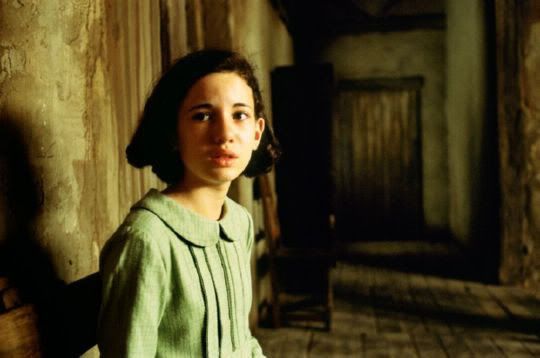
Ofelia
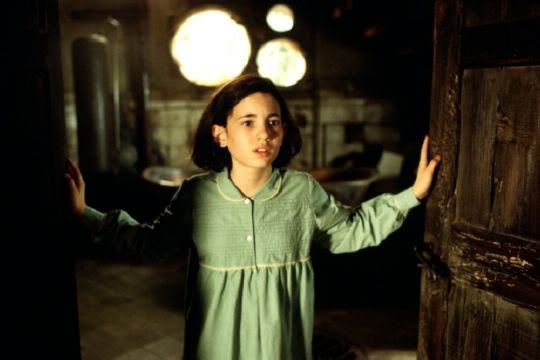
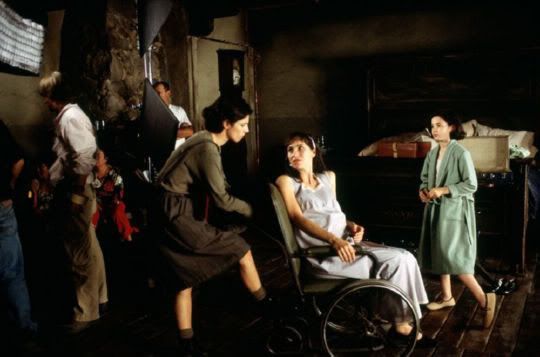
Ofelia and her mother (in the chair) and Mercedes
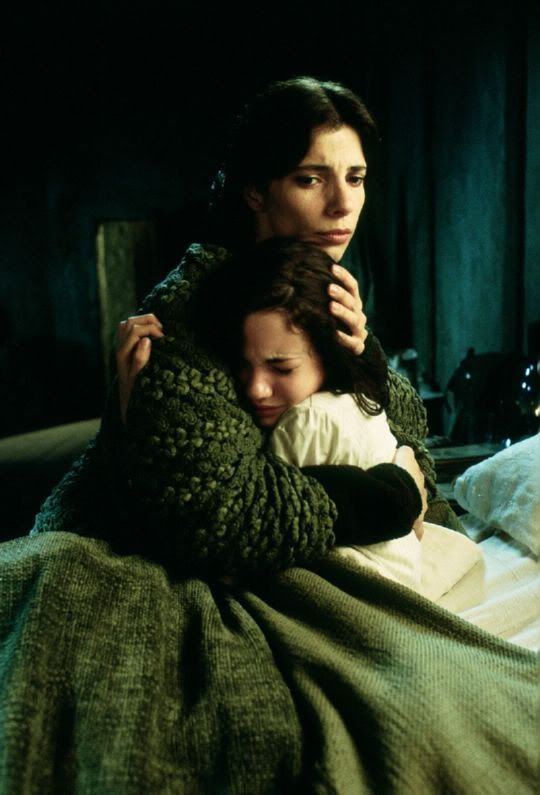
Mercedes and Ofelia
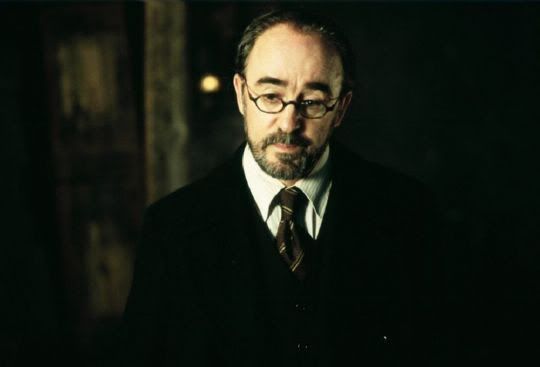
Dr. Ferreiro
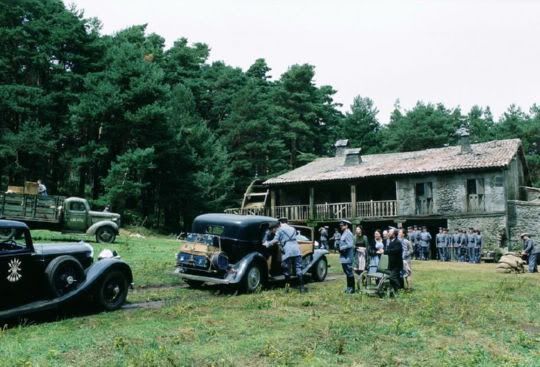
Approaching the village
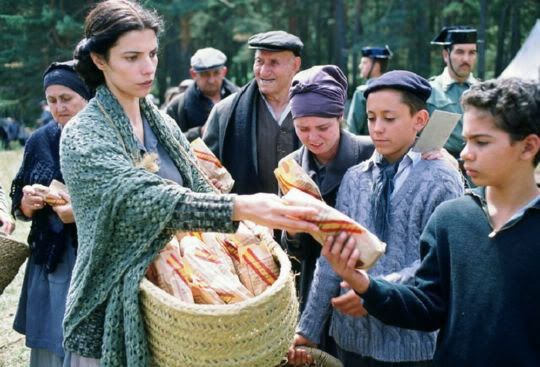
Mercedes handing out bread rations

Mercedes
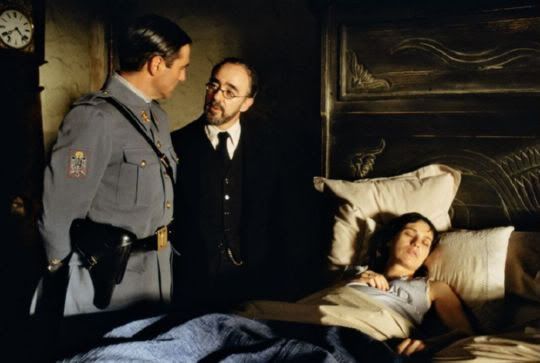
Captain Vidal, Dr. Ferreiro & Ofelia's mother
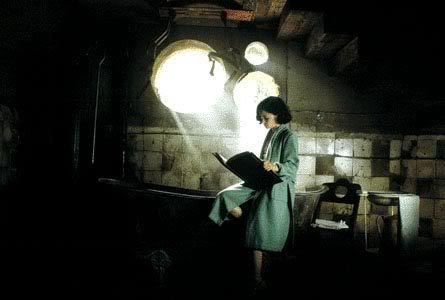

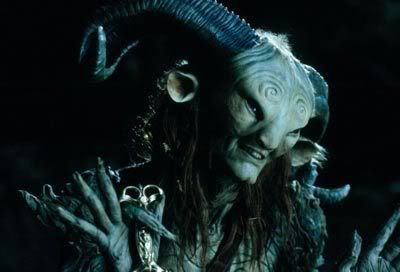
The Faun
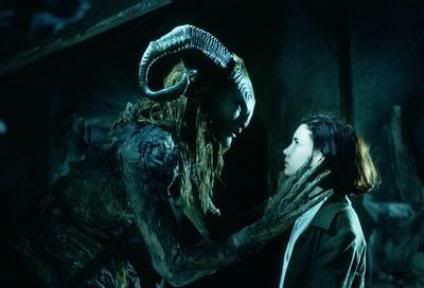
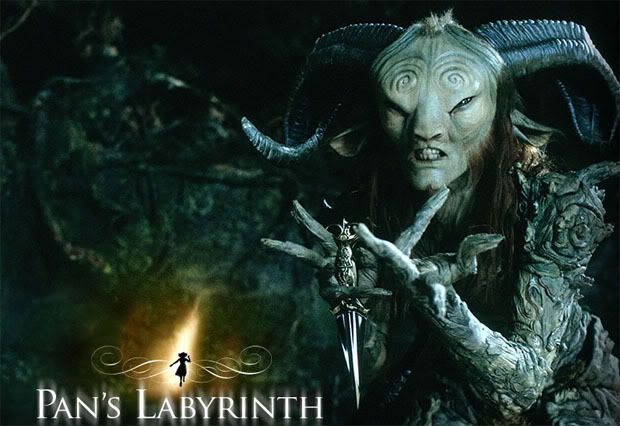
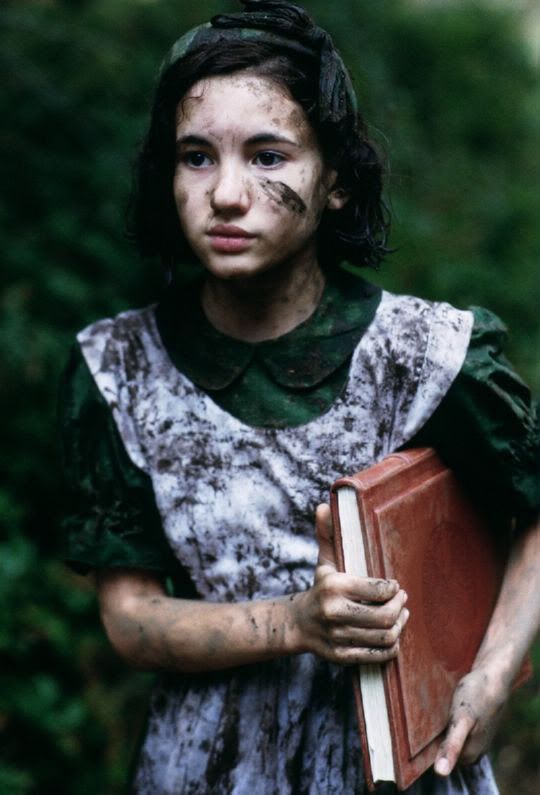
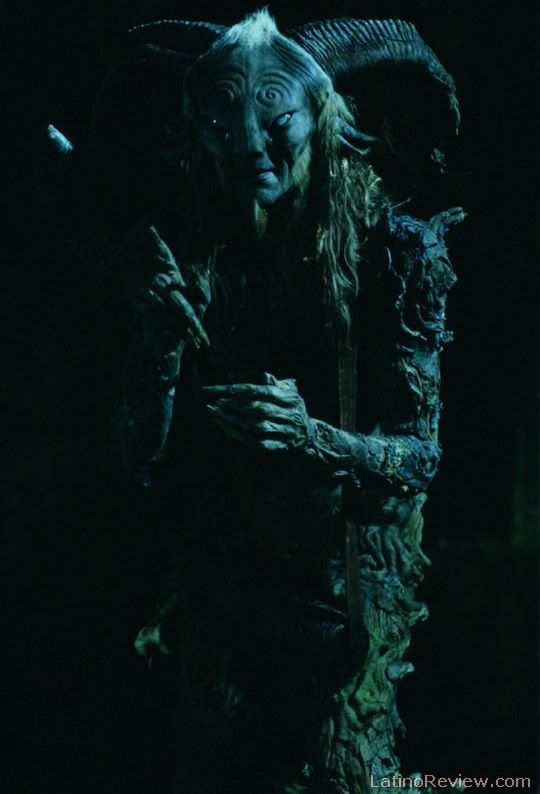
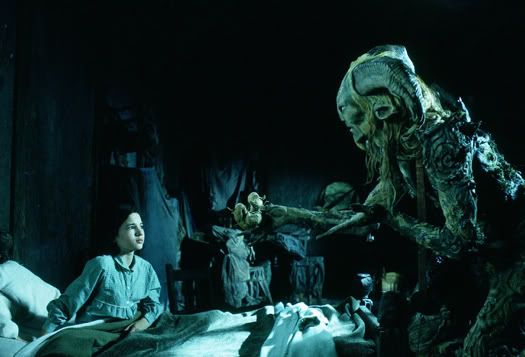
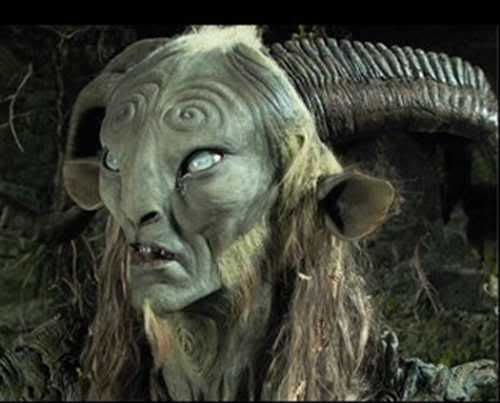
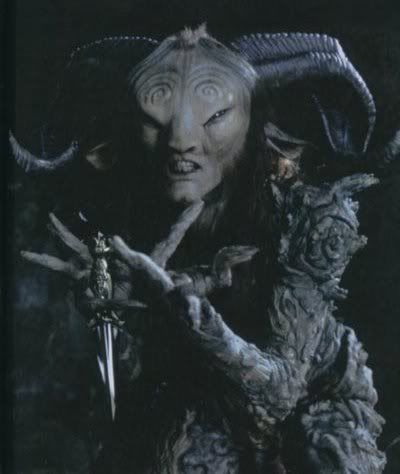
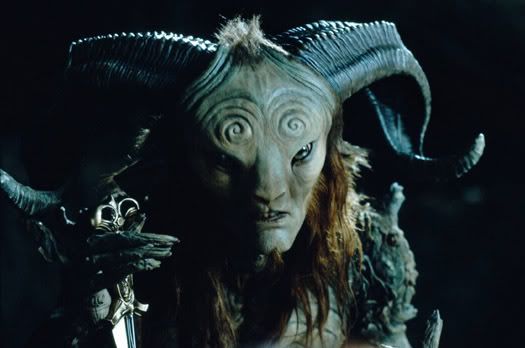
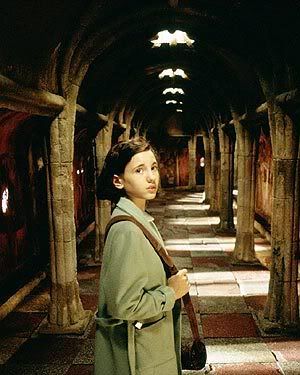
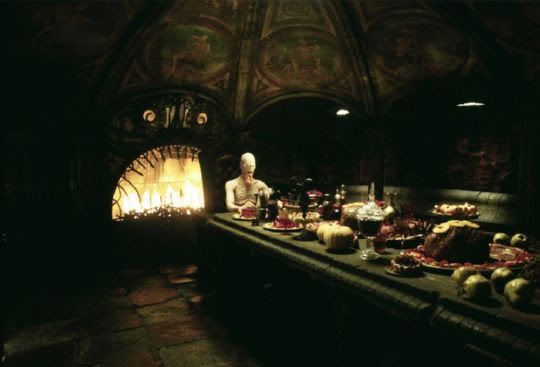
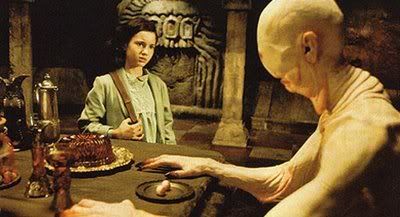
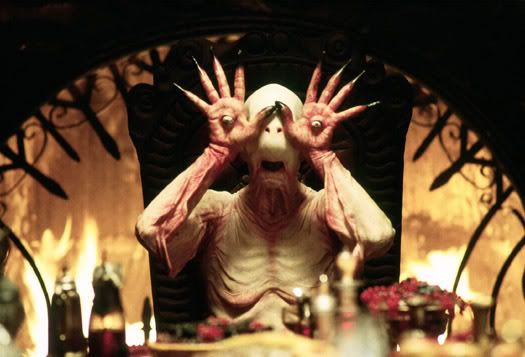
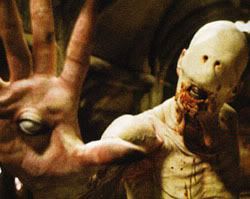
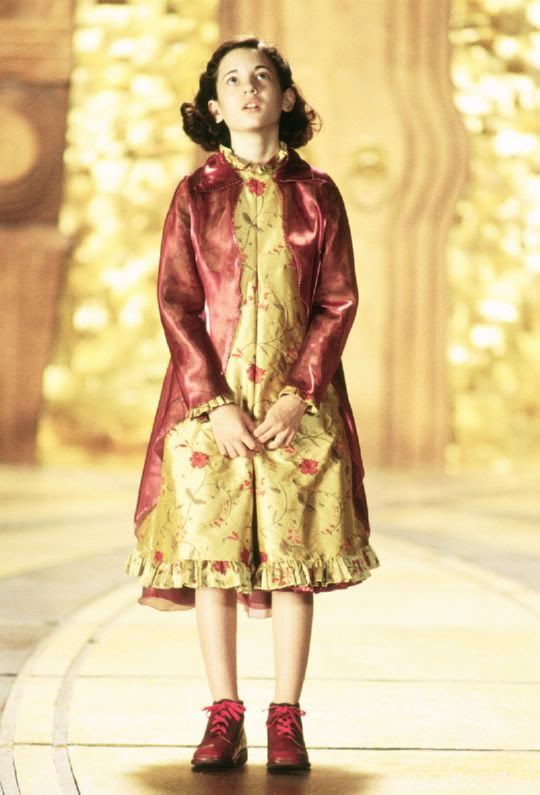
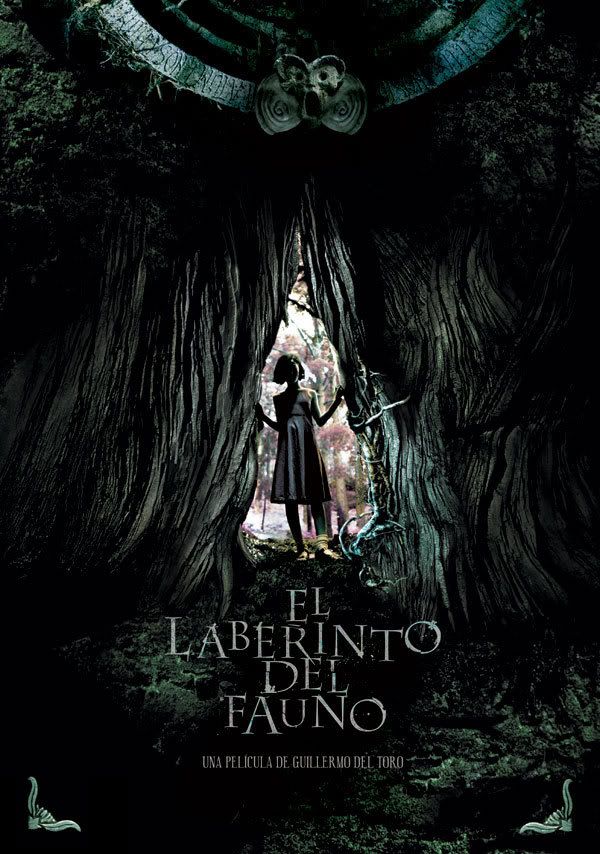


It is a gorgeous film. Directed by Mexican director Guillermo del Toro, El Laberinto del Fauno (it's Spanish title) is visually spectacular and so imaginative throughout its fantasy sequences, but it is also one of the most visceral and terrible (please note that I use "terrible" NOT in the sense of "bad" but rather in the sense of extreme/intense/severe) films I've ever seen. I rarely have to cover my eyes or look away, and I did in this film.
When the film let out, icajoleu asked me and N if we liked the film. I said: "I don't think "like" is the word I can use. It's not a question of like. It was incredible and beautiful and terrible all at the same time." Which means that it's very hard for me to recommend this film - if you can take it, and are willing to sit through one of the darkest films you may ever see, then please, by all means, knock yourself out. I'm not sorry I saw it. But definitely be forewarned (I was, and still I was not entirely prepared). This is a film about evil and cruelty and horror...and about how courage and goodness can stand against such things and not let them destroy everything worth saving in the world.

Pan's Labyrinth tells the story of Ofelia, an adolescent girl, who is sent into the country with her mother, who is near the end of what looks like a difficult pregnancy. They make this journey because Ofelia's new stepfather, is an officer in the fascist regime and commands a garrison at a small town in the country that is trying to stamp out a band of guerrillas who oppose the new government. He is very insistent that his child, his son, should be born with him, in the New Spain that they are creating.
We see immediately that Ofelia inhabits a world of magic and fantasy, and there is never any question that her fantasies are real - only that others cannot see them, which makes things a bit more interesting, in my opinion. When she first arrives to the village, she discovers that there is a labyrinth in the woods that Mercedes, the Captain's housekeeper, warns Ofelia against.
Ofelia's vivid fantasy world is juxtaposed with some of the most horrific scenes of human brutality. del Toro does not flinch from showing us the horrors of which humans are capable, and the violence in the film serves to underline the growing urgency and fear that builds in Ofelia's fantasy life. As reality grow darker around her, so do her dreams and fantasies. Like many of the fairy tales that Ofelia loves, there is a chosen one with a mission, and Ofelia must perform tasks in order to earn her reward.
Ofelia's stepfather, Capitan Vidal, is a fearsome character: a man with no conscience, who spares nothing to achieve his goals, he is a first-rate sadist. I think it's safe to say that he is a monster. There is nothing redeeming about him whatsoever. One pities poor Ofelia and her mother for ever becoming associated with such a creature in the first place, but it's clear after a while that Ofelia's mother only turned to him out of necessity and desperation in difficult times, and it's entirely possible that she never had a choice.
Two characters that stand out in their duality and resistance to the dark regime that rules their village are Mercedes, the captain's housekeeper, and Dr. Ferreiro. Mercedes faithfully obeys the captain and takes care of all the household duties without a single word of complaint - and yet, she also smuggles food and letters to the guerrillas in the forest (her brother is one of them) whenever she can. The doctor also helps the guerrillas by bringing them medicine and medical attention. Both characters demonstrate the ability to think independently, something that del Toro wants to point out to us as a contrast to the officers under Captain Vidal who seem to be disturbed by his extreme brutality, and yet they say and do nothing to temper his actions. Near the end, when the Captain questions Dr. Ferreiro as to why he did not follow the captain's orders to keep a young guerrilla alive (who had been horrifically tortured), the doctor answers: "But captain, obey for obey's sake... That's something only people like you do."
As I mentioned earlier, the visuals are stunning. The film is very dark, purposefully so, because the few scenes that are bright are dazzlingly so. Ofelia's journey from innocence into darkness is stark and we follow this through her fantastic adventures: meeting the faun, receiving her tasks, and carrying them out. We never disbelieve the reality she experiences for an instant because like the captain's brutality, her fantasies are so vivid and real and authentic. The end could be terribly sad, but I insist that it also contains great hope: that sacrifice is necessary for better things to come after, that goodness will triumph at the end, no matter how dark things seem.

Ofelia


Ofelia and her mother (in the chair) and Mercedes

Mercedes and Ofelia

Dr. Ferreiro

Approaching the village

Mercedes handing out bread rations

Mercedes

Captain Vidal, Dr. Ferreiro & Ofelia's mother



The Faun














